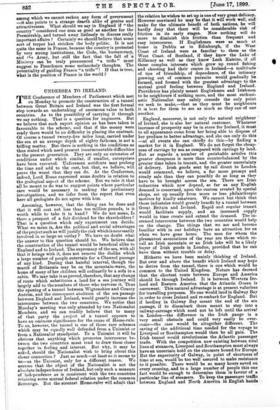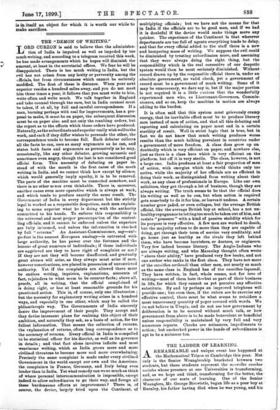UNDERSEA TO IRELAND. T HE Conference of Members of Parliament which
met on Monday to promote the construction of a tunnel between Great Britain and Ireland was the first formal step towards an undertaking of enormous value to both countries. As to the possibility of carrying it through we say nothing. That is a question for engineers. But we believe that such expert opinion as has been taken is favourable to the scheme, and that if the money were ready there would be no difficulty in placing the contract. Of course a tunnel twenty-five miles long, carried under the sea at an average depth of eighty fathoms, is not a trifling matter. But there is nothing in the conditions as thus stated which need present insurmountable difficulties to the present generation. They are only an extension of conditions under which similar, if smaller, enterprises have been executed. Unforeseen accidents may prolong the time and add to the cost, but that, we believe, will prove the worst that they can do. At the Conference, indeed, Lord Rosse expressed some doubts in relation to the geological aspect of the scheme. But we take it that all he meant to do was to suggest points where particular care would be necessary in making the preliminary investigations, and we infer from the report that even here all geologists do not agree with him.
Assuming, however, that the thing can be done and that it will cost not less than ten million pounds, is it worth while to take it in hand ? We do not mean, Is there a prospect of a fair dividend for the shareholders ? That is a question which only experiment can decide. What we mean is, Are the political and social advantages of the project such as will justify the risk which is necessarily involved in so large an outlay ? We have no doubt what the answer to this question should be. We believe that the construction of the tunnel would be beneficial alike to England and to Ireland. The supremacy of the sea, with all that it brings with it, does not remove the dislike which a large number of people entertain for a Channel passage of any kind. During that hateful interval, though the march of Britannia may be on the mountain-wave, the home of many of her children will ordinarily be a sofa in a cabin. We may take it as proved, therefore, that any change of route which substitutes a land for a sea journey will largely add to the numbers of those who traverse it. Thus the opening of a tunnel between Wigtonsbire and County Antrim, and the consequent abolition of the sea passage between England and Ireland, would greatly increase the intercourse between the two countries. We notice that Monday's meeting was only attended by two Nationalist Members, and we can readily believe that to many of that party the project of a tunnel appears to have an ominous significance for the cause of Home-rule. To us, however, the tunnel is one of those rare schemes which may be equally well defended from a Unionist or from a Nationalist standpoint. To a Unionist it will be obvious that anything which promotes intercourse be- tween the two countries must tend to draw them closer together in feeling and interest. But why, it may be asked, should the Nationalist wish to bring about this closer connection ? Just as much—at least so it seems to us—as the Unionist, only for a different reason. We assume that the object of the Nationalist is not the absolute independence of Ireland, but only such a measure of independence as is consistent with the two countries retaining some mutual federal relation under the common Sovereign. But the stoutest Home-ruler will admit that the relation he wishes to set up is one of very great delicacy. However convinced he may be that it will work well, and make for the ultimate benefit of both nations, he will hardly deny that there will be considerable risk of ' friction in its early stages: Now nothing will do more to diminish this friction than frequent and easy intercourse. If Englishmen were as much at home in Dublin as in Edinburgh, if the West Coast of Ireland were as familiar to them as the West Coast of Scotland, if they knew the Lake of Killarney as well as they know Loch Katrine, if all those complex interests which grow up round fishing and shooting had their centre in Ireland—a multitude of ties of friendship, of dependence, of the intimacy growing out of common pursuits would gradually be formed, and formed with the greatest advantage to the mutual good feeling between England and Ireland. Providence has plainly meant Englishmen and Irishmen to be neighbours if nothing more, and the most enthusi- astic Nationalist may safely concede the only point we seek to make,—that as they must be neighbours it is best for them to see as much as they can of one an other.
England, moreover, is not only the natural neighbour of Ireland, she is also her natural customer. Whatever increase of prosperity may be in store for Ireland, it must " to all appearance come from her being able to dispose of her produce to better advantage, and she can only do this —at all events she can chiefly do this—by finding a market for it in England. We do not forget the cheap- ness of carriage by sea as compared with carriage by land. But as regards a number of perishable articles this greater cheapness is more than counterbalanced by the greater time taken in transit, and the greater uncertainty of delivery. Irish goods sent by rail direct to London would command, we believe, a far more prompt and steady sale than they can possibly do so long as they have to be brought across the sea. There are Irish industries which now depend, so far as any English demand is concerned, upon the custom created by special shops, set up usually from more or less philanthropic motives by kindly amateurs. We cannot but think that these industries would greatly benefit by a tunnel between Great Britain and Ireland. Rapid and regular transit would facilitate supply, and an increased supply would in time create and extend the demand. The in- creased intercourse between the two countries would help on the change. The things that we see and become familiar with in our holidays have an attraction for us when we have gone home. The man for whom the pleasantest associations of the year are those which re- call an Irish mountain or an Irish lake will be a likely buyer of Irish goods in London, provided that he can have them without trouble or delay.
Hitherto we have been mainly thinking of Ireland. But over and above the benefit which Ireland may hope to derive from the tunnel, there is one which would be common to the United Kingdom. Nature has decreed that the shortest route between Europe and America should lie through Ireland. It is between Western Ire- land and Eastern America that the Atlantic Ocean is narrowest. This natural advantage is at present valueless for travelling purposes. No one would land in Galway Bay in order to cross Ireland and re-embark for England. But if landing in Galway Bay meant the end of the sea passage, if to disembark there meant to step into a railway-carriage which need not be left until the arrival in London—the difference in the Irish gauge is a very small obstacle and could very easily be over- come—the case would be altogether different. The saving of the additional time needed for the voyage to Liverpool or Southampton would then be all gain. The Irish tunnel would revolutionise the Atlantic passenger trade. With the competition now existing between rival lines of steamers, Liverpool and Southampton must always have an uncertain hold on the steamers bound for Europe. But the superiority of Galway, in point of shortness of time at sea, would be too well assured to make resistance to it possible. There would be so many hours saved on every crossing, and to a large number of people this one fact would be enough to determine them in favour of a particular line of steamers. To keep the passenger traffic between England and North America in English hands . is in itself an object for which it is worth our while to make sacrifices.







































 Previous page
Previous page